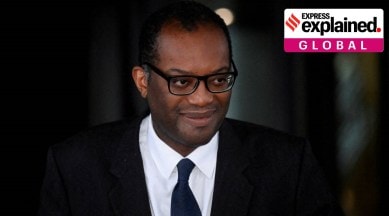Who is Kwasi Kwarteng, and why was he sacked as UK Finance Minister?
Kwarteng had insisted on Thursday that he was “not going anywhere”. But on Friday, he tweeted a letter addressed to Truss, stating that he was no longer serving as Chancellor after he was asked to “stand aside”.

UK finance minister Kwasi Kwarteng was fired from his post on Friday (October 14) only weeks into the job, making him Britain’s second shortest serving Chancellor of the Exchequer. Kwarteng served for 38 days in the job; Tory Chancellor Ian Macleod had served for 30 days in 1970 before he died after a heart attack.
The Times had previously reported that Prime Minister Liz Truss was expected to fire Kwarteng and would soon announce plans to backtrack on significant parts of her “mini-budget” that was unveiled on September 23.
Kwarteng had insisted on Thursday that he was “not going anywhere”. But on Friday, he tweeted a letter addressed to Truss, stating that he was no longer serving as Chancellor after he was asked to “stand aside”.
Jeremy Hunt, a former Health and Foreign Secretary, will now serve as Britain’s finance minister.
Who is Kwasi Kwarteng?
Born and raised in London in 1975, Kwarteng is the only child of his Ghanaian parents who came to Britain in the 1960s as students. He studied at the UK’s most elite institutions — Eton College where he finished his schooling, and the University of Cambridge where he earned a BA and PhD in history.
Before beginning his political career, he worked as a columnist in a newspaper and as an analyst in financial services.
Like Truss, Kwarteng was elected Conservative Party MP as part of a new group of politicians called the “class of 2010,” the BBC reported.
A supporter of Brexit, Kwarteng backed Boris Johnson’s prime ministerial bid, and served as a Minister of State at the Department for Business, Energy and Industrial Strategy in his administration. As part of a mini-cabinet reshuffle, he was given the post of Secretary of State in the same department.
Following Johnson’s resignation in 2022, Kwarteng backed Truss’s campaign. After her appointment as Prime Minister, Kwarteng was made the Chancellor of the Exchequer, becoming the first black leader to hold the post in the UK.
What did he do as Chancellor?
A few weeks after being appointed by Truss on September 6, Kwarteng announced a new set of economic policies, which were dubbed the UK’s “mini budget”. These changes were aimed at kick-starting a stagnating UK economy and containing the country’s record rates of inflation, of which the biggest contributor was soaring energy prices.
Kwarteng had announced a freeze on energy bills, which according to the government, would reduce inflation by as much as 5 percentage points. He also pledged £45bn of tax cuts, the biggest reductions in the past 50 years. It was considered to benefit all taxpayers — both individuals and companies — to varying degrees.
The government’s idea was that with more money in the hands of people and companies, consumer spending would be boosted and businesses would be incentivised to invest in the economy.
What happened as a result?
His fiscal plan had disastrous consequences — it led to massive market volatility, tanked the currency, and increased mortgage rates.
Britain’s central bank, the Bank of England, was forced to intervene in the debt market, with growing concerns that pension funds could be threatened, The New York Times reported.
There were also concerns that the government had ignored expert advice. Before announcing the “mini-budget,” Kwarteng had fired the top official at the Treasury and set aside the Office for Budget Responsibility, a watchdog that investigates such announcements, The New York Times report said.
In light of both international and domestic criticism of the economic policies, there were growing concerns within the Conservative Party whether yet another leadership change was required.
What has Kwarteng said?
In his letter to Truss, Kwarteng acknowledged that “the economic environment has changed rapidly” since the mini-budget was announced.
Stating that he was fully aware of the difficult economic situation plaguing the UK, he has affirmed his position that the low growth rates and high taxation “must still change if this country is to succeed”.
Pledging his continued support to Truss, Kwarteng wrote, “I believe your vision is the right one.”